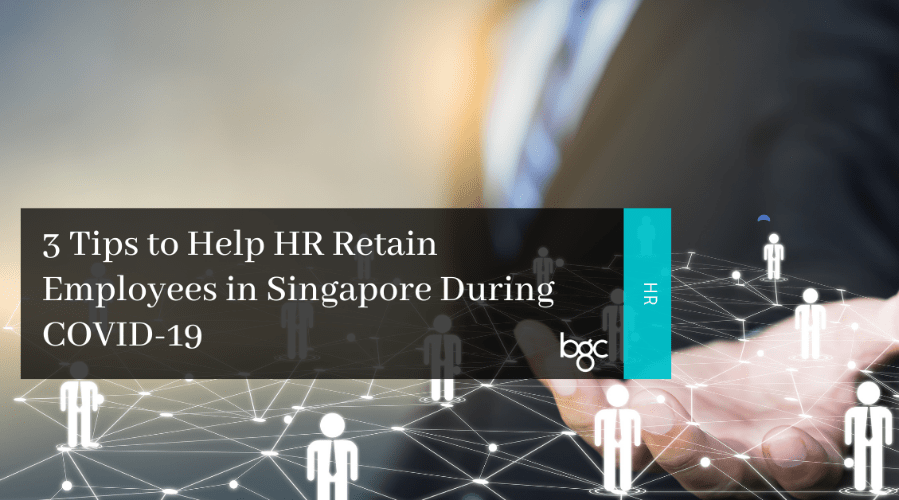Now that the turbulent effects of the pandemic is reaching an end. Companies will have to focus on other problems such as retaining employees. When good talents leave, the productivity of the company sinks, morale struggles, and your employees are left to deal with an increase in workload.
But how can companies in Singapore stop employees from leaving? As an HR outsourcing agency, we believe that having a good employee retention plan is key to keeping your best talents to yourself. Which we will be diving into in this article!
Why Employee Retention Matters to HR

Contrary to popular belief, HR employees and managers are not always willing to sacrifice their employees. Research conducted by Gallup revealed that replacing an employee is an expensive endeavour — it costs up to half the employee’s monthly salary to find and replace them. Not to mention the amount of time it takes to find the right employee — which can increase significantly according to different industries (e.g. cybersecurity and tech to name a few). In addition, employee retention can also affect HR KPIs.
Common Reasons Employees Leave Singapore Companies

Before we begin listing different ways you can save your employees. Let us first describe the different reasons why employees leave companies despite the turbulent economy.
1. They’re bored
Bored and disengaged employees might have some trouble staying in their jobs. A disengaged employee not only brings down office morale. It’s a ticking time bomb. Bored and disengaged employees are one trigger away from leaving.
As such, these are some of the many reasons why employees are bored:
Your employees feel stagnant: Employees who feel like they’re not learning enough will feel disengaged from their jobs. In a study conducted by Udemy, 4 out of 5 employees surveyed agreed that learning a new skill will make them a lot more engaged at work. One way to overcome this is through employee training programs. Give your employees upskilling and access to subsidised training programs.
Your employees don’t have enough work: Mundane, everyday work will lead to bored and listless employees. Spice is the essence of life. This statement rings especially true - surveys show that 30% of employees equate boredom with lack of work. Keep your employees interested by delegating and giving them the opportunity to complete new tasks. Find responsibilities that are challenging yet interesting for them.
Pro-tip: Keep in mind that overworked and busy employees can also lead to bored employees. Too much work can often lead to burnout and the inability for employees to “turn off”. Learn more about the potential problems employee burnout can bring in this BGC Group article.
2. The company has bad management
Management mishaps can sometimes be fatal. According to JPMorgan Chase’s Vice President of Recruiting, Wendy Duarte, “most people don’t quit their jobs, they quit their managers”. Unprepared or terrible management can make employees feel like they’re going astray. Or worse, on a highway to nowhere in particular. Poor attitude from management can foster a toxic work environment. The key to overcoming bad leadership is to adopt traits that employees look out for in a good manager.
Some good leadership traits revered by employees include empathy, the ability to understand what your employees want, and being open to name a few. Finally, the best leadership skill that’s often gleaned over is emotional intelligence. Managers who are emotionally intelligent are often self-aware, have self-control, be socially aware, and better manage work relationships to name a few.
Learn more about the benefits of emotional intelligence both to the leader and the organization here.
3. The company is not invested in employee retention
Employees with no sense of purpose or direction are more likely to leave. Training, investing in your employees’ career goals and giving your employees new opportunities needed can help retain your employees. Other ways to help your company boost retention rates include reviewing your organization’s compensation and benefits plan.
Although, we believe that a personalised compensation and benefits plan can help your organization retain its best talents. This can be done by:
Finding out what your employees want: Employee engagement surveys are a great way to find out what your employees want. It allows employees to let employers know of their motivations and expectations anonymously. More information on employee engagement surveys and how to run one available in this BGC Group article here.
Crafting the perfect company culture and brand: These days, millennial and Gen Z employees are on the hunt for companies with the ideal company culture and branding. Unlike their older counterparts, younger employees are on the lookout for non financial related benefits. Before you begin, it is best to understand what it is that your young employees want.
Thankfully, we have some employee retention articles that could be helpful:
What Do Millennials Want from Their Workplace?
The Kids Are Not Alright: Why Millennial Employees Lose Their Motivation
What Do Gen Z Employees Want From Their Workplace?
7 Tips for Twenty Somethings in Singapore Who Want to Get Hired Fast
There you have it! Three major tips for HR individuals to help retain employees during the pandemic. What are some tried and tested methods to retain employees? Share your thoughts with us in the comments section below! Keep in mind that we will be updating this article with more information in the near future.
Read More: Why You Should Consider Diversity and Inclusion in Your Next Hire
